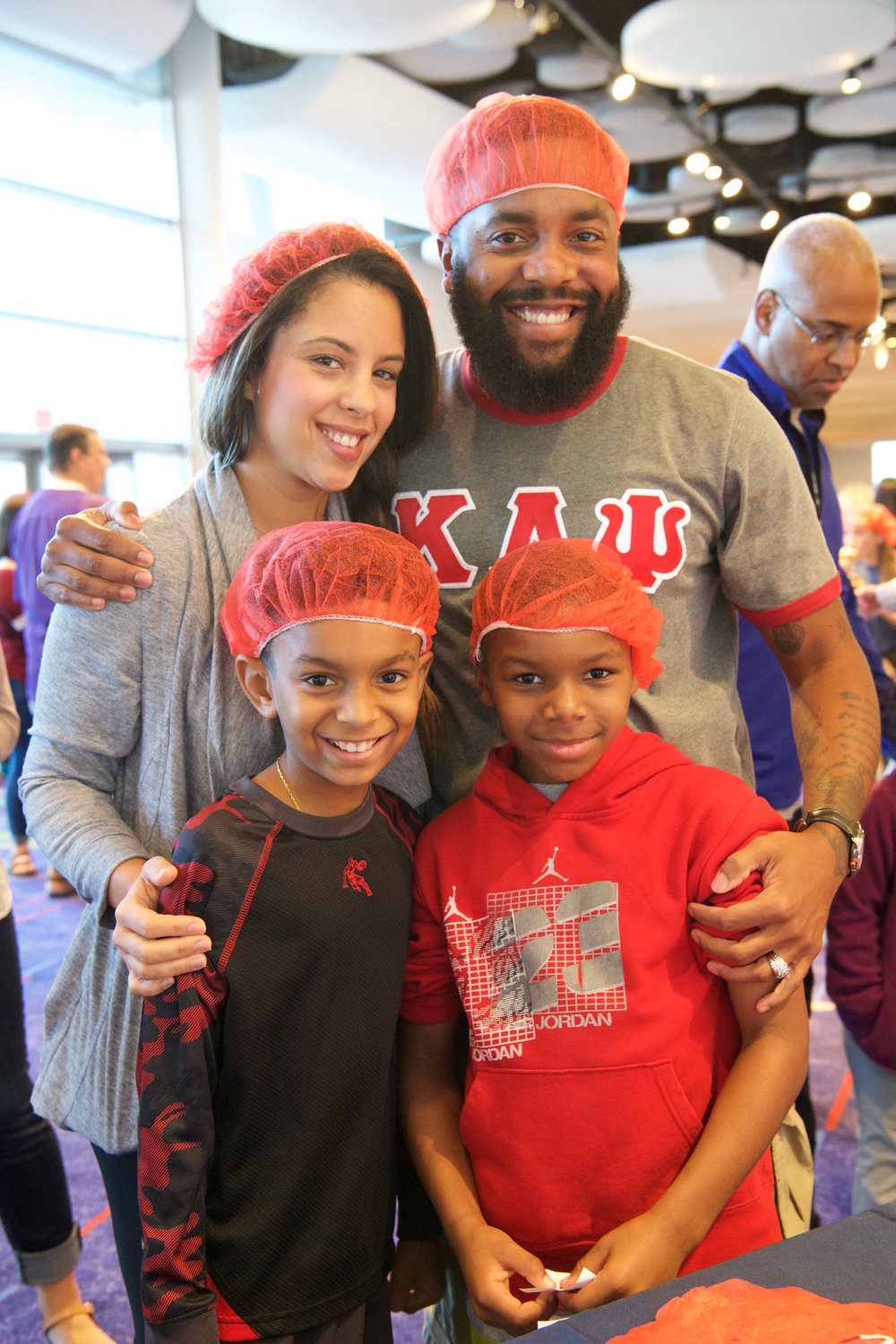We think differently about the orphan crisis.
CARE for AIDS exists to mobilize the church in caring, both physically and spiritually, for families affected by HIV/AIDS in East Africa. We approach the orphan crisis differently. By intervening in the lives of HIV+ parents, we empower them to live long enough to raise and educate their children and even see their grandchildren.
A Message from our founder
“We are honored to work with you and on your behalf in East Africa.”
Africa UPDATE
In 2016, we launched our most rigorous monitoring and evaluation system to date. As we continue to grow and expand the CARE for AIDS program, we realize the importance of data and are committed to transparency. Through this process we can ensure that the CARE for AIDS program is making lasting impact in the lives of our clients.
Since deploying this new system we have seen that, on average, a CARE for AIDS client experiences the following impact in the course of our nine-month program:
25% Increase in CD4 Count
A CD4 Count (Cluster Differential 4) is a lab test that measures the number of CD4 cells (also known as T-cells) in a sample of blood. The higher this count, the stronger a person’s immune system, and the more able they are to fight off opportunistic infection.
27% Increase in weekly savings
92% of babies born to clients tested HIV-negative
Babies born to HIV+ mothers undergo an HIV test at birth, six weeks after birth, and 18 months after birth. Test results at 18 months are conclusive. Data on babies born during the CARE for AIDS program is reported by parents before the conclusive 18 month test has been conducted.
Welcome to Tanzania
After almost a decade of working in Kenya, we were eager to replicate our model in other countries. Dar es Salaam, Tanzania made for a perfect location due to its proximity to Kenya, its shared language, and similar level of need. With over 200,000 adults living with HIV in Dar es Salaam and only about 30% of people identifying as Christians, we knew the need for physical and spiritual transformation was high. We are so excited for this next chapter of CARE for AIDS and cannot wait to see how lives and eternities are impacted in Tanzania.
“What attracted me the most about CARE for AIDS was the orphan prevention model. Tanzania has a high infection rate- in Dar es Salaam alone, 6.9% of the population is living with HIV. I am excited to be launching this program because I love my country, and I think CARE for AIDS will do a lot of good here.
”
A Look Back at Banana Hill
At CARE for AIDS, our church partnerships are intentionally finite. We intend to partner with churches and operate our centers for 7-10 years in order to empower and care for families affected by HIV/AIDS in their communities. When we reach a point we have saturated the community with care (when we can no longer recruit the target number of vulnerable clients), we end our official operations in that church and move those resources to another community. Our goal is to leave each church equipped to continue working with the people in their communities who are living with HIV/AIDS. When we leave a community, we consider it a success - we did as much as we could, and it is now time for the church to carry on with its work.
In March of 2014, we closed operations in our center at Banana Hill Baptist Church (learn more here). We went back to Banana Hill in November and interviewed the pastor to see how things have been going.
The first thing you notice when walking into Pastor Thomas’ office - other than his warm smile and handshake - is a certificate from CARE for AIDS that reads:
“Certificate of appreciation awarded to Banana Hill Baptist Church for the successful 5 year partnership in the implementation of the CARE for AIDS program under the leadership of Pastor Thomas Kariuki. The partnership brought transformation to 355 men and women both physically and spiritually. Awarded on this date, 11th March 2014.
”
Below is an interview with Pastor Thomas about how things have been going in his church and community since 2014:
Thank you for meeting with me. I know as a pastor your time is limited, and I really value the time you are giving me.
My pleasure. It’s always good to be reconnected to CARE for AIDS.
So, our official partnership with Banana Hill Baptist ended more than two years ago. What’s been happening in your church since then for families affected by HIV?
Well, we still have many HIV-positive members in our church. Most of them joined our church after going through the CARE for AIDS program but others have joined recently.
We are in touch with them. They come to worship with us. They come to me for counseling and encouragement. Just two weeks ago, the MCA for our area wanted to do a project with a group of families living with HIV/AIDS, and they told him if he wants to work with them he has to go through me.
Can you help me understand what that means? What is an MCA?
That’s the Member of County Assembly- our local government representation. Part of his job is to create programs for people living with HIV, but they didn’t want to work with him. They wanted to continue working with me and the church, so they told him if he wanted to get connected, to come to the church.
Wow. That shows how much the community trusts you.
Yes. We have a really good relationship, and these families feel safe at our church. You know, stigma related to HIV/AIDS is still high, so they don’t want to work with just anybody or trust everyone. Because of the CARE for AIDS program, they know they can trust this church.
Its amazing to see how the program has impacted them and shaped their view of the church. I wonder about the perception going the other direction - how did the program change your church’s view of people living with HIV? How did it change you as a pastor?
It changed me so much. My view of HIV used to be a little backwards, which I didn’t fully realize. I used to condemn people living with HIV. Not always with my words, but in my heart. I have learned now that they are innocent and they need to be listened to. They need to be accepted and cared for. It really changed the way I preach, and the way I counsel people. I no longer condemn them.
I’ve realized that we are all affected by HIV. We all have brothers, sisters, friends, mothers, fathers who are infected with HIV. It’s not their disease. It’s ours. All of us.
That’s so true and so powerful. Like you said, stigma is still very real and it’s keeping people from accessing treatment. If we reduce stigma and people can talk openly about HIV, it will go a long way in helping eradicate the disease. What is your church doing to help break stigma? What would you like to do?
I’ve encouraged some of our HIV-positive members to share in church about their status. It’s hard for them to do it, though. I bet there are people in my congregation living with HIV who just haven’t told me yet. I need to help them be open and honest. Personally, I preach about HIV so that people know it isn’t a curse or a result of sin. I have been wanting to invite HIV-positive pastors to come and preach and share their story.
That’s great. Ok, I am aware that I am taking up a lot of your time, so I just have two more questions for you: In your opinion, did we end our partnership with you well, or could we have done something better? Would you recommend other churches to partner with CARE for AIDS?
Yes! I highly recommend it. It impacted my church so much. It was a great experience for us. I think you ended it so well. We knew from the beginning that when we couldn’t recruit a full class of clients, it would be time for you to take the resources elsewhere. And I agree with that model so much! We can take it from here.
New Staff
Kefa Naya, Ziwani Center (SC)
Lilian Munji, Ziwani Center (HC)
Daniel Mbugua, Waithaka Center (SC)
William Wasilwa, Mukuru Center (SC)
Justus Musyimi, Githurai Center (SC)
Marvin Musili, Kariobangi Center (SC)
Joan Waitherero, Mathare Center (HC)
Jude Muchiri, Mathare Center (SC)
Janipher Mukunya, Huruma Center (HC)
Jacob Kinyanjui, Huruma Center (SC)
Judy Kanyi, Dandora Center (HC)
Noah Bunde Randa, Dandora Center (SC)
Abbie Rapoport, Operations Coordinator
(HC) Health Counselor
(SC) Spiritual Counselor
Faith Mumbi Musau, Regional Empowerment Coordinator
Kennedy Okoth, Regional Accounts Coordinator
Nimrod Tsuma, Mtwapa Center (SC)
Hildah Kazungu, Mtwapa Center (HC)
Douglas Ngoro, Mtopanga Center (SC)
Beatrice Cherono Bii, Mtopanga Center (HC)
Joyce Kanini, Changamwe Center (HC)
Emmanuel Nkwamu, Regional Coordinator
Laison Mtega, Assistant Regional Coordinator
Anna Mnkabenga, Regional Empowerment Coordinator
Eva Kinkoro, Regional Accounts Coordinator
Stanley Erasto, Vingunguti Center (SC)
Esther Gerald, Vingunguti Center (HC)
Amos Gasper, Mburahati Center (SC)
Janet Nassali, Mburahati Center (HC)
U.S. Update
We never want to be accused of dreaming or praying small. We want to pray big, bold prayers and ask God to do something miraculous. A year ago, we set a goal to double the reach and impact of our programs in Africa by the end of 2018. This meant expanding from 30 to 60 centers throughout Kenya and Tanzania. These centers will bring about transformation beyond measure in individuals, families, churches, communities, and even nations.
We need $8.5 million to accomplish this big goal. In 2016, we launched a three-year campaign to fund this vision.
“Bold prayers honor God, and God honors bold prayers. God isn’t offended by your biggest dreams or boldest prayers. He is offended by anything less. If your prayers aren’t impossible to you, they are insulting to God...if you don’t take risk, your forfeit the miracle.”
In the first year of this campaign, we raised 74.9% of our $8.5 million goal:
Three-Year Campaign Progress
We are overwhelmed by the generosity and excitement we have seen from our community, and we know that the Lord is preparing CARE for AIDS to reach thousands of families in the years to come.
Learn more about how you can get involved in this vision here.
At CARE for AIDS, we value empowerment and education, particularly related to the empowerment of underserved youth. In 2016, we were honored to have partnered with the Gifted Education Foundation, the Chick-fil-A Foundation, and generous donors Donald and Brenda Thompson to host a fully sponsored trip to Kenya for six high school students—three from Booker T. Washington High School in Atlanta, GA and three from Sugarcreek High School in Charlotte, NC. We love creating international educational experiences that will help inspire the next generation of globally-minded entrepreneurs, policymakers, and leaders.
“It was the trip of a lifetime. I have a different outlook on my life now. I want to start a business that will make a difference globally.
”
On November 5th, 2016, nearly 600 volunteers joined together to pack 336,000 nutritious meals for our clients in Kenya. Having access to nutrition, medication, spiritual support, education, and employment resources helps clients break the cycle of poverty and disease. Nutrition is a particularly important aspect of physical transformation for our clients. The food packed during the Hunger Project will enable us to provide proper nutrition to support our clients and their families through five full phases of the CARE for AIDS program.
Hear one family's story of how the nutrition aspect of our program impacted their lives:
Save the date for Hunger Project 2017
Saturday, August 19, 2017
Financials
2016 Contributions
Individuals $1,810,246
Foundations $463,158
Churches $124,377
Corporations $73,283
In-Kind $72,500
Total Contributions: $2,543,564
2016 Expenses
Program
Kenyan Operations $1,303,411
Impact Trips $255,518
In-Kind $72,500
Fundraising $268,903
U.S. Operations $245,358
Total Expenses: $2,145,690
Board of Directors
Board of Directors
Cliff Robinson, Board Chairman, SVP of Field Operations, Chick-fil-A
Nick Gordon, Board Secretary/ Treasurer, Consultant, BCG
John Wills, Co-Founder & Principal, MedApproved
Donald Thompson, Founder and CEO, Maxwell Group
Kylie White, Blogger and Orphan Advocate
Michelle Slatton, Designer
Stan Reiff, Partner, National Consulting Practice Leader, Capin Crouse
Jeffrey Moredock, Vice President, Kainos Capital
Wayne Hoover, VP Field Operations, West Region, Chick-fil-A
Ryan Grant, VP and Managing Director, Parker Executive Search
Randy Gravitt, CEO, InteGREAT Leadership
Bobby Reagan, CEO, Reagan Consulting
Justin Miller, Co-Founder and CEO, CARE for AIDS

























































